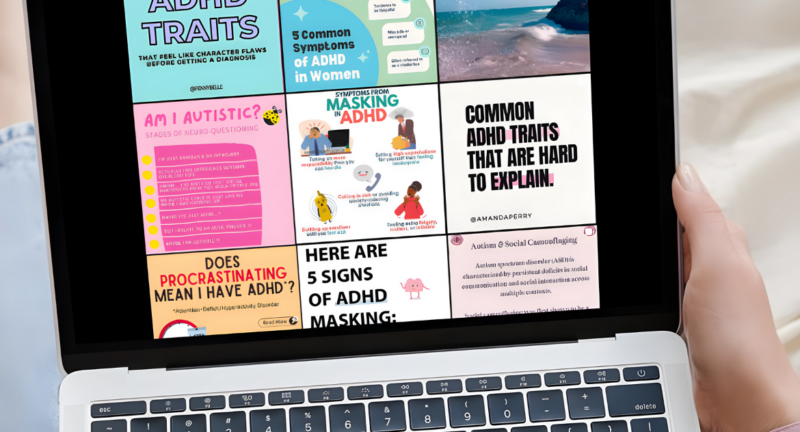

Is Neurodivergence a Disability?
March 26, 2024 by Counseling and Wellness Center of Pittsburgh ADHD, ASD, ASDs, autism, autism spectrum disorder, autism spectrum disorders, disability, neurodivergence, neurodiversity, neurodiversity affirming therapy, neurotypical, obsessive compulsive disorder, OCD 0 comments
The short answer is, the experiences of neurodivergence can be disabling, but they are not disabling for everyone with related diagnoses/symptoms. It is important to note that Disability is a medical and governmental term that comes with specific criteria and limitations for recognition – rather than being a diagnosis, it is related to the severity of impact that symptoms of a diagnosed illness have on an individual’s functioning in main areas including personal/independent care, emotional stability, and employability. While neurodivergence is experienced by many people with disabling illnesses, it is not a diagnosis or a disability-related criterion.
What Does it Mean to Be Neurodivergent?
Neurodivergence meaning “different brain,” is a non-medical umbrella term used to discuss symptoms and experiences of people with diagnoses like Autism Spectrum Disorder (ASD), Obsessive-Compulsive Disorder (OCD), Attention-Deficit Hyperactivity Disorder (ADHD), sensory-limiting illnesses/experiences, and more.
These symptoms and experiences tend to impact a person’s engagement with their environment and with other people, especially in social situations. In the last several years, the public discussion of mental health and neurodivergence has become more robust and open, with the effect of beginning to “normalize” neurodivergence. The assertion may become that there is no “normal way to think,” rather than highlighting that the individual’s thinking is, in some way, outside the average experience, which reinforces those experiences as pathological (driven by illness).
Every Neurodivergent person has a unique spectrum of experiences
For some, a denial of neurodivergence as potentially disabling goes beyond personal definitions, and sometimes to the point of denying others’ differing experience of the same illness (e.g., “If I could develop the coping skills, so can you.”). In response, many disability advocates with ASDs and ADHD and their caregivers push back for multiple reasons, including the recognition that “internalized ableism” can cause some people with a disabling illness to feel shameful and deny the personal impacts of that illness.
They may suffer without a range of aids that they should be able to access with diagnosis and traditional treatments (e.g., financial and medical assistance, transportation, education and job placement programs, housing programs, and more). The tangible benefits one may receive from accepting their symptoms as disabling when they are, have the potential to prevent significant episodes of illness that require even higher levels of care. This argument can be especially prevalent in advocates who both experience neurodivergence and parent a child with neurodivergence.
Well, I’m Neurodivergent and I don’t like being thought of as disabled
That’s totally reasonable! Being neurodivergent is not inherently disabling, but many people who can be described as neurodivergent do experience disabling symptoms. The same way that it can be harmful to internalize beliefs related to ableism (e.g., “I’m just lazy,” “my situation isn’t too bad,” “I should be able to control myself without medicine”); it can be harmful to internalize the societal associations between symptoms, disability, and personhood (e.g., “being disabled makes me less”).
It is important to recognize that a person’s experience of symptoms is influenced by a number of factors like pre-disposition and co-morbid illness (happening at the same time), social supports, healthy caregiver attachments, and access awarded by privilege (e.g., diagnosis and treatment may be more or less accessible depending on where you live, the insurance you have, and/or disposable income). Even with these variables, there is a level of self-determination that comes with gaining insight into your symptoms and whether they are disabling for you.

What might Neurodivergence look like?
- Sensory: One person with ASD may be hypersensitive (over-feel) or hyposensitive (under-feel) to the point where they cannot be in spaces with several people talking (sound), cannot draw a bath/temper a shower alone (touch), cannot tolerate certain food/drink (taste), cannot be in an office space with overhead lighting (visual), and cannot be around certain smells without a physical reaction (scent); whereas another person with ASD may be able to self-accommodate or compensate for those experiences to avoid disruptive episodes by using noise-canceling headphones/ear plugs, avoiding or blocking unpleasant foods and smells, declining an invitation, or even self-advocating for accommodations from their host/group prior to the event.
- Verbal: Some people with neurodivergence communicate in a way that is uncomfortably direct and more matter-of-fact than others are comfortable with. Some can only think in pictures, without words. For those neurodivergent folks who can comfortably compensate, this may cause occasional misunderstanding or embarrassment. For those who experience more profound communication differences, it may mean being unable to make nuanced discussion; for others still, it may mean never having developed a verbal language. This can impact a person’s ability to maintain relationships, employment, and engage with systems like banking, housing, legal aid, etc.
- Emotional: It is often believed that people with neurodivergent experiences, especially those with ASD, do not feel empathy for others. Rather, the emotional reactions of a person with neurodivergent symptoms tend to be exaggerated or limited, but they do typically recognize emotional experiences in others, even when they are not understood. We can see this in the progressive change in behaviors/responses as a person ages. By adulthood, many with neurodivergent experiences have developed behaviors based on social reflection and mimicking, sometimes referred to as “masking,” which act as a protective factor in a variety of interactions.
- Thinking/Planning: Many people with neurodivergent experience have rigid beliefs structures and behave with an adherence to rules that make sense to them. They may go on fact-finding expeditions before engaging with rules, both to ensure the rules make sense/are worth following, and that they truly understand what is being expected. For some, unclear rules/regulations cause a level of discomfort that is manageable through various coping skills; for others, any level of uncertainty is overwhelming enough to trigger an emotional response, which can have negative impacts on relationships and maintaining employment.
These clusters of experience look different for children than they do for adults, primarily because we have different expectations for behavior of children than we do adults. Some of these “differences” are normal development in children, depending on their age and socialization.
It is always important to consult with your child’s pediatrician and/or child therapist if your child engages in behaviors that become increasingly problematic for their social development in school, relationships with other children, and/or at home with the family. The responses we have to our children’s behaviors help, in part, to shape the impact those behaviors and related symptoms will have on their health and wellbeing throughout their lives.

Neurodiversity and a life worth living
As with most mental health experiences, neurodivergent symptoms are primarily problematic when a person begins to have negative impacts in important areas of functioning like caring for yourself, having employment/financial stability, and emotional stability. If your neurodivergent experiences make life a little harder, but you feel like your life is fine the way it is, that’s great!
However, if your neurodivergent experiences make life way harder than it should be, like distancing you from people you want to be with, losing your employment or other stabilizing factors, or causing you extreme emotional distress, therapy can help you find the comfort zones that make you a life worth living.
Interested in Therapy From a Neurodiversity Affirming Therapist?
If you are interested in therapy with one of our many Neurodiversiy affirming therapists please call as us at 412-856-WELL or fill out the form below. We’re here to support you every step of the way.
Written by Ang Scotto (they/them/theirs), LSW, a seasoned virtual psychotherapist with over 5 years of experience.
Related Posts
Self Diagnosis: Do I Have ADHD? Do I Have Autism?
April 25, 2024
Self Diagnosis: Do I Have ADHD? Do I Have Autism? In recent years, there has...
What Makes Someone a Hoarder?
July 19, 2024
What Makes Someone a Hoarder? Hoarding Disorder Overview Hoarding Disorder...



